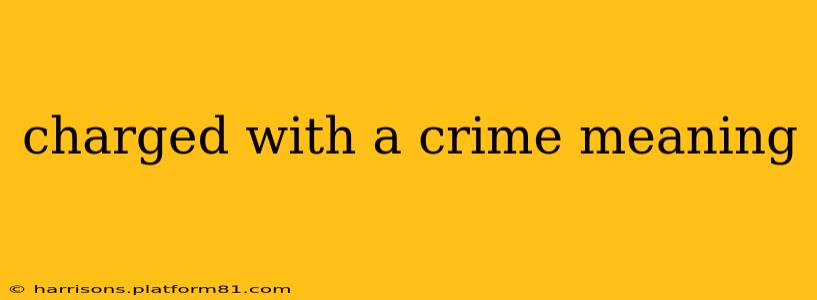Being "charged with a crime" is a significant legal event with far-reaching consequences. It marks the formal accusation by law enforcement that an individual has committed a specific offense. This seemingly simple phrase encompasses a complex legal process that can significantly impact a person's life, liberty, and reputation. Understanding what it means to be charged with a crime is crucial for anyone facing such an accusation, as well as for anyone seeking a clearer grasp of the criminal justice system.
What Does it Mean to be Charged with a Crime?
Being charged with a crime means that law enforcement has gathered enough evidence to believe a person committed a specific crime, and they've formally presented those charges to the court. This usually involves an arrest, although charges can sometimes be filed without an arrest initially (e.g., through a summons). The charges are outlined in a formal document, often called an indictment or information, specifying the alleged crime(s) and relevant legal statutes.
This process is distinct from being suspected of a crime or being investigated for a crime. A suspicion is simply a belief that a crime might have been committed. An investigation involves gathering evidence to determine if a crime was actually committed and who is responsible. A charge, on the other hand, represents a formal accusation and the beginning of the formal legal proceedings.
What Happens After Being Charged with a Crime?
Once charged, the legal process begins to unfold:
- Arraignment: The accused will be brought before a judge for an arraignment. At this hearing, the charges are formally read, the accused is informed of their rights (including the right to an attorney), and they are asked to enter a plea (guilty, not guilty, or no contest).
- Bail or Pretrial Release: The judge may set bail, a sum of money the accused must pay to be released pending trial. Alternatively, the accused might be released on their own recognizance or subject to other conditions.
- Discovery: Both the prosecution and the defense exchange information and evidence relevant to the case. This allows both sides to prepare their case thoroughly.
- Plea Bargain Negotiations: In many cases, the defense and prosecution will attempt to negotiate a plea bargain, where the accused pleads guilty to a lesser charge or agrees to a reduced sentence in exchange for avoiding a trial.
- Trial: If a plea bargain is not reached, the case proceeds to trial, where a judge or jury will decide the accused's guilt or innocence.
- Sentencing: If found guilty, the accused will be sentenced by the judge, which could include imprisonment, fines, probation, or community service.
This is a simplified overview; the specifics vary significantly depending on the jurisdiction, the severity of the crime, and other factors.
What are the Different Types of Charges?
Charges range significantly in severity, from minor offenses (like traffic violations) to serious felonies (like murder or armed robbery). The type of charge will greatly influence the potential penalties and the legal procedures involved. The classification of a crime (misdemeanor or felony) is determined by the statutes in the applicable jurisdiction.
What are My Rights if I'm Charged with a Crime?
If charged with a crime, you have several fundamental rights, including:
- The right to remain silent: You are not obligated to speak to law enforcement without an attorney present.
- The right to an attorney: If you cannot afford an attorney, one will be appointed to represent you.
- The right to a fair trial: This includes the right to a jury trial (in most cases), the right to confront witnesses, and the right to present evidence in your defense.
What is the Difference Between Being Charged and Being Convicted?
It's crucial to distinguish between being charged with a crime and being convicted of a crime. Being charged is the formal accusation; a conviction is a formal judgment of guilt after a trial or plea bargain. A person is presumed innocent until proven guilty in a court of law. A charge is simply the beginning of a legal process; a conviction signifies the end result, with the associated consequences.
Understanding the meaning of "charged with a crime" is the first step in navigating the complexities of the legal system. If you or someone you know faces such an accusation, seeking legal counsel immediately is vital to protecting your rights and ensuring a fair outcome. The information provided here is for general understanding only and should not substitute for professional legal advice.
